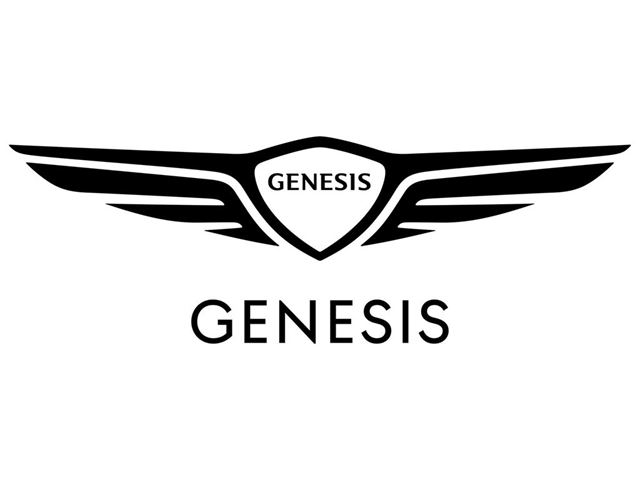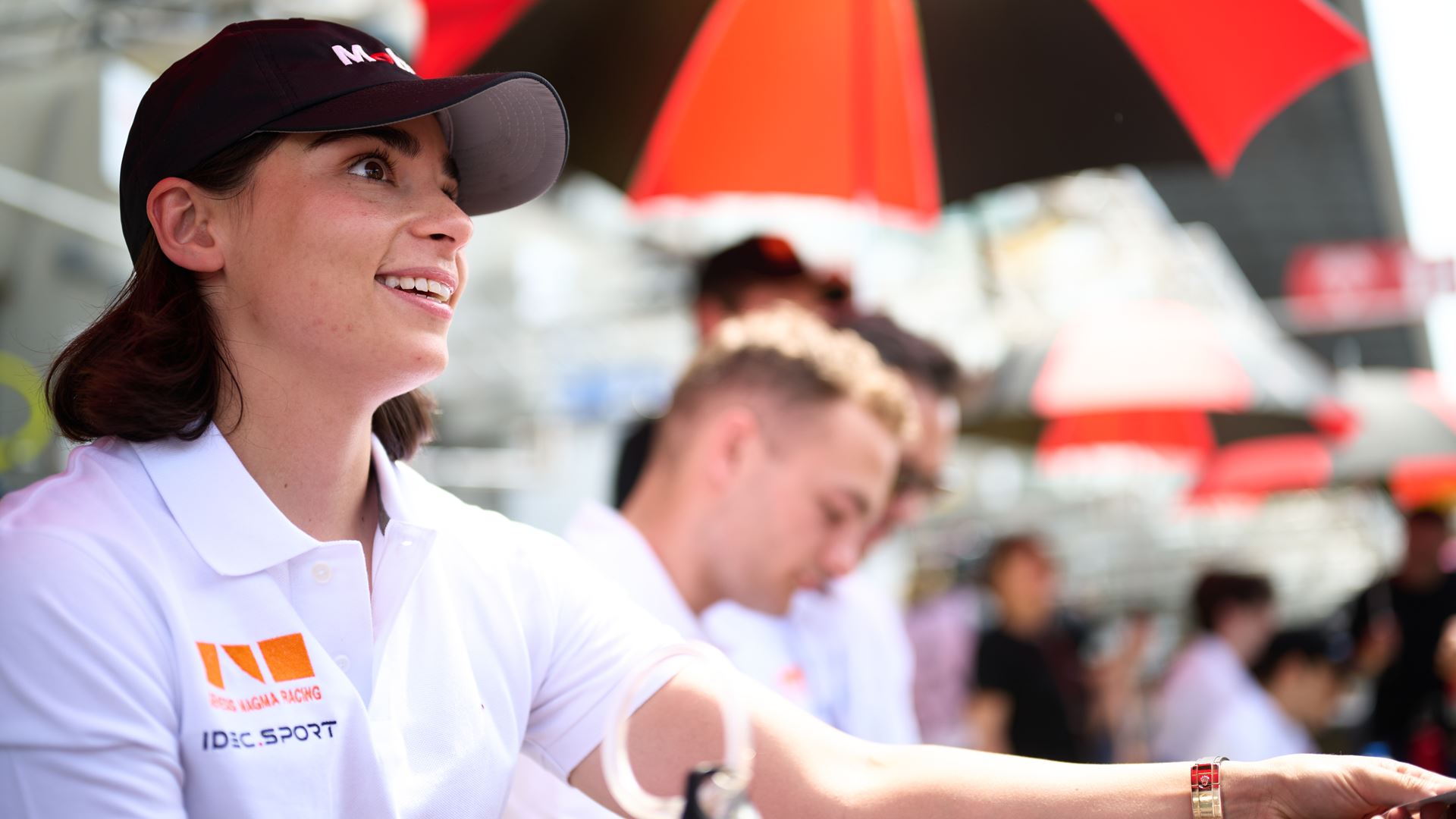Le Mans, France, Thursday 12th June: As a three-time W Series champion and the only female driver to win a race in the Indy NXT motorsport series, Genesis Magma Racing Trajectory driver Jamie Chadwick has not only shattered glass ceilings but also redefined what it means to be a champion in an intensely competitive arena.
The Genesis Magma Racing Trajectory program supports drivers’ development, working towards promoting them into the Genesis Magma Racing hypercar team at the 2026 FIA WEC.
Hot on the heels of an exhilarating start to the season, where she scored an LMP2 class victory with her teammates at Circuit de Barcelona-Catalunya in April and also won the European Le Mans Series (ELMS) at the Circuit Paul Ricard in May, Jamie Chadwick is poised to leave an indelible mark on the track and beyond, while inspiring a new generation of racing drivers across the globe.
Chadwick took some time out of her busy schedule to speak to the Genesis Newsroom about her journey with Genesis Magma Racing, highlighting the innovative spirit, advanced technology and collaborative team dynamics that have further fuelled her passion and ambition for motorsport.
What were your initial impressions of the Genesis Magma Racing team, and what aspects of the team and technology drew you to join the Trajectory program?
My initial impressions were that it’s an incredible program, and obviously one that I would love to be a part of. Hypercar now is becoming one of the most competitive forms of motorsport out there. So, for the Genesis brand to be aligning with it, and coming into it, and starting for us with the Trajectory program has been incredibly exciting. The team members that they’ve brought in, particularly coming from the World Rally Championship, bring a huge amount of experience, and that’s really exciting. And then, from a technology point of view, I think what we’re seeing with the Hypercar technology, the hybrid engines, and then obviously being tested at some of the hardest races in the world, including the 24 Hours of Le Mans, is incredibly exciting.

You’ve had a front row seat since the beginning. What excites you most about being a part of this journey?
I think for me the most exciting part is the potential trajectory, to use the term of the program that I’m a part of, yeah, obviously, the Hypercar is very much the end goal of my career. It’s the highest category of endurance racing, and a level I’d love to reach that is hugely competitive at the moment as well. So, I think what excites me is seeing that pathway and then being part of a team that I think can have a huge amount of success within the FIA World Endurance Championship (WEC). It’s great to be a part of, and it’s cool to see it from the very beginning, its inception.
You were in Dubai for the launch of Genesis Magma Racing in December last year. What was this moment like for you, standing beside the car that’s redefining both your career and the brand?
It’s incredibly exciting. I think for me, seeing any road car manufacturer come into our sport and into endurance racing, is always very cool to see. But also, when you look at the people that are surrounding the GMR-001 Hypercar project — the likes of Andre Lotterer, Cyril, Pipo, Jacky Ickx — being a part of the brand is incredibly exciting. I think it shows that they are going to be a force when they come into the WEC.
How do you and the team leverage telemetry data and analytics to redefine or to refine both your driving techniques and race strategies during a competitive race weekend?
Using data and the technology we have available to us is hugely important. It’s instant. We can use it immediately to change things, to improve, to see what’s better, what’s worse. It’s a big part of our sport, and it’s part of the reason I love the sport so much — getting that immediate feedback, especially when you’re working with so many experienced people within our team. It really helps us, I think, particularly on the strategy side. Being able to make quick decisions with the information that you and the engineers have available has definitely helped us with the results that we’ve had. And then, from a driving point of view, you can see exactly where you need to improve. With the experienced teammates that I have as well, that really helps us make quick improvements.

This year for learning has already brought strong results for the team. How would you describe the collective effort behind those performances, and what has been the key to that success?
This year so far, we’ve had a lot more success than I think we were anticipating early on. We came into the season just wanting to learn as much as possible. We loosely gave ourselves a top five target, but winning The LMP2 in the opening two races of the European Le Mans Series (ELMS) championship has definitely exceeded our expectations. I really think the reason for it has been the big team element. I think we’ve worked really well, particularly from a strategy point of view. We haven’t made big mistakes, and we’ve managed to kind of pick up and make the most of others, in that sense, in two tricky races that haven’t been easy to manage. So, yeah, I think teamwork has been a huge part of it. We’ve had a really reliable and good car for the last few races as well. So, fingers crossed, we can keep that momentum going forwards.
What are you most eager to achieve in the long run?
I think in the long run my ultimate goal is to go to Hypercar and compete at the highest level of endurance racing. In the short term, I obviously want to try and win more races in the ELMS championship, and with Le Mans coming up soon as well, of course, the goal is to go there and get the best result possible in our first 24 Hours of Le Mans.
Transitioning from other racing series to the Genesis Magma Racing program presents unique challenges. Can you discuss how you’ve adapted, and what lessons you’ve learned so far?
The biggest lesson I’ve learned is, I think, trying to adapt as much as possible. The car, every time you get in, is slightly different. You’ve got to constantly adapt to what you have, the different conditions, the different circumstances that you have in a race. So, the biggest lesson has to be adapting. And then, obviously, in an endurance race, it’s a long race, so it’s not all made or won in your stint. Often just trying to do the best job you can in that moment, make the most of the strategy you’ve got, and then giving the car to make the finishes is the biggest thing. And the main way that I feel like I’ve been able to adapt is by having a really good team with a lot of experience, which has helped me learn quickly. The IDEC Sport team have got a huge amount of experience in this category, and I think being able to lean on them and have their support has helped a lot too.

What is the hardest lesson you’ve learned in motorsport?
I think that it doesn't matter what level you get to, you still have to work hard, and you’re always still learning. I think, in motorsport, it is never going to be plain sailing. The good days are always the good days, but to have those moments come together isn’t always easy. There are so many variables in our sport that it takes a lot for everything to come together. So yeah, you have a lot more bad days than good days, but stay motivated and hungry for it, even in those days, and work hard for when it goes right again.
After your recent impressive victories at Barcelona-Catalunya and Paul Ricard, how has that success influenced your confidence and mindset for the rest of the season?
I think it’s changed the goalposts that we’ve set for ourselves. I think coming into the season we definitely wanted to learn as much as possible, but we gave ourselves no target on results, and now I think the recent wins have given us a little bit more of a higher focus for the rest of the season, particularly with regards to the championship. And I think confidence-wise, we know we’ve got two races under our belt. We know what we’ve been capable of achieving as a team and as a group. So, carrying that now into the rest of the year, knowing what we’re capable of, I think, is a really positive thing and has definitely given us a slightly higher target for the rest of the season.
How do you usually prepare for the race, both on and off track? Do you have any personal routines or rituals that help you stay grounded?
I try not to set too many rituals or routines, but a lot of the preparation for me away from the track is physical preparation. Yeah, obviously, being new to endurance racing, long stints in the car, the physicality is something that I work hard on. And then preparation with the team at IDEC Sport, simulator preparation, trying to understand the race weekend as best as possible before going into it, particularly for something like Le Mans, is going to be a big part of it.
You’ve stepped into Formula One commentary. Has that experience changed your view of racing or influenced your approach as a driver?
I feel like I now have a different view on things, having seen it from the other side of the microphone or the camera. I also think F1 is at such a high level now, we can all learn so much from there. Being able to see it up close and analyse a lot of different situations, whether that be from a technical or driving point of view, I feel like I’m learning every day being able to do that. So, it’s given me a new perspective. It’s something I enjoy. I love being part of the Formula One Grand Prix. So yeah, it’s definitely helped influence my approach as a driver.
As a successful woman in a traditionally male-dominated sport, what unique strengths do you bring to the track, and what message would you share to aspiring female drivers?
I would say, I don't think too much about being a woman at the track when I’m competing in my own right. I just want to do the best job possible. But at the same time, I think I’m proud to try and do as much as I can for the next generation of female drivers. I think the sport is drastically changing, and particularly in endurance racing, we’re seeing a huge shift of female talent. There are so many great opportunities for women now in our sport. I think we’ve now seen five women on the top step in the ELMS alone, which is incredible to see. So, I think my message to young, aspiring female drivers would be to not let anything put you off — keep pushing.

Can you share your favourite memory with Genesis Magma Racing so far?
I’d say my favourite memory would definitely be that first win at Barcelona, mainly because we weren’t expecting it. But it was such a special weekend for all of us on the team — the first race, officially, for Genesis Magma Racing, and first win. And to have a lot of the team members that have been a part of it since the beginning all there sharing that moment was very special.

